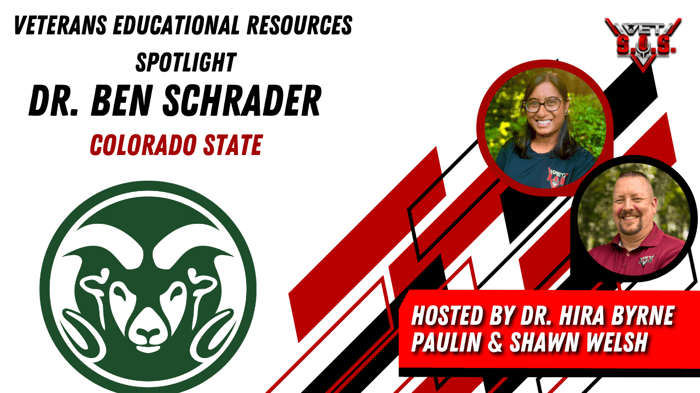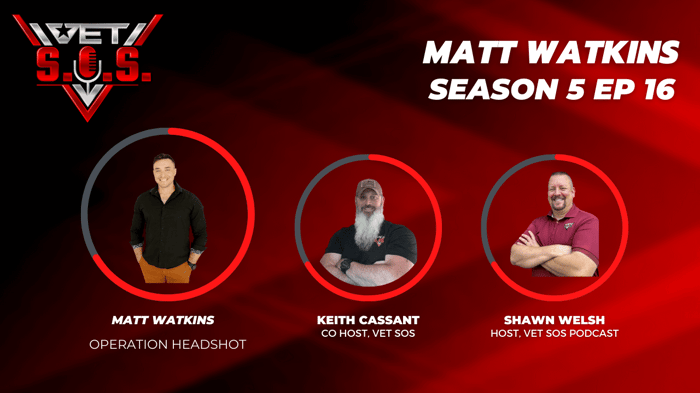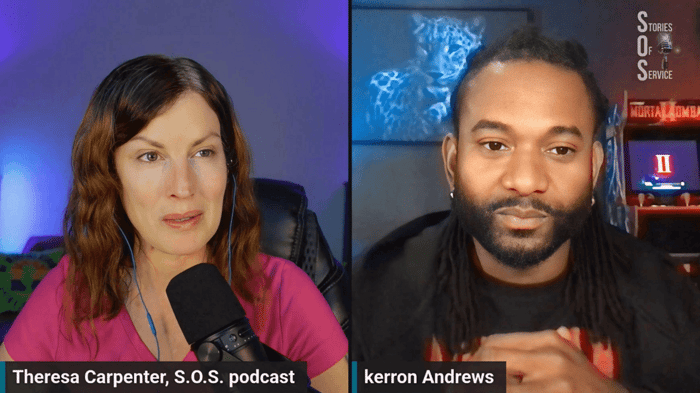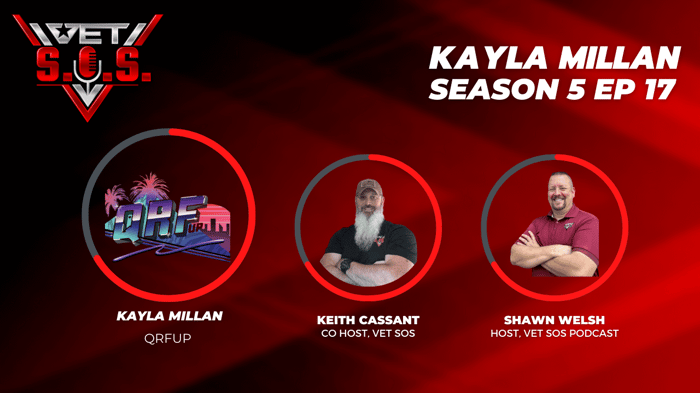Championing Veteran Education: How Colorado State University Empowers Military-Connected Students
Veteran education is more than just offering GI Bill benefits or military discounts—it's about providing real support that helps transitioning service members succeed academically, socially, and professionally. As veterans shift from military service to civilian life, the pursuit of higher education can be both a powerful tool and a significant challenge. That’s where institutions like Colorado State University (CSU) stand out.
In this feature from the VET S.O.S. – Veteran Educational Resources Spotlight podcast, Dr. Ben Schrader, Director of CSU’s Adult Learner and Veteran Services (ALVS), shares how the university is creating a national model for veteran education. From building a supportive campus environment to offering targeted scholarships and transition programs, CSU is reshaping what it means to serve veterans in higher education.
Dr. Ben Schrader’s Journey: From Soldier to Scholar
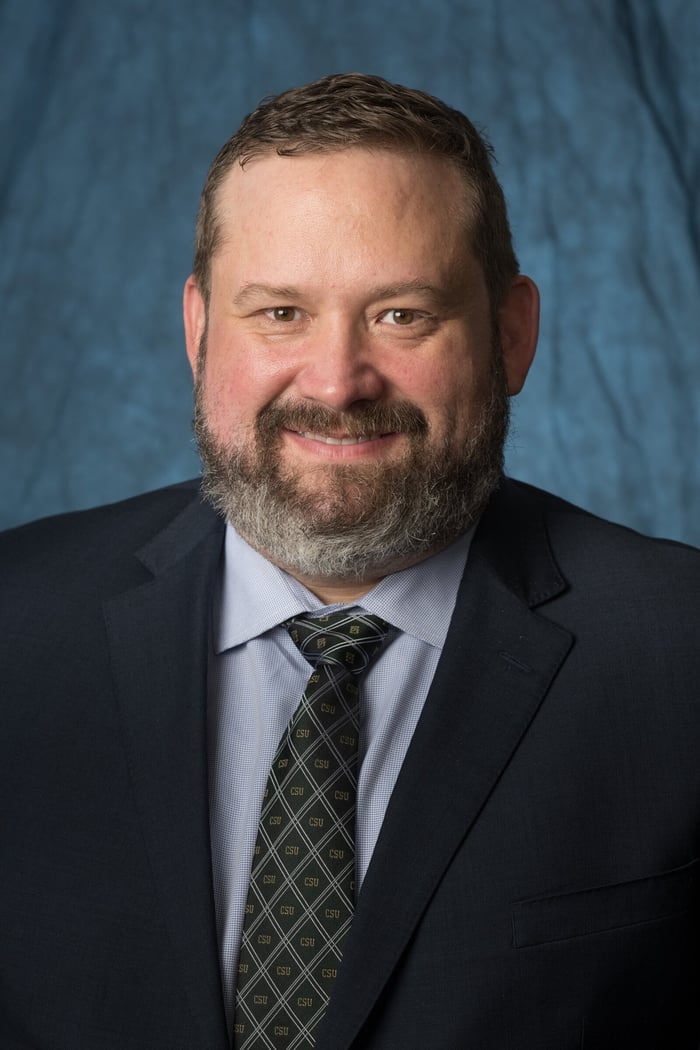 Dr. Ben Schrader
Dr. Ben SchraderDr. Schrader brings a deeply personal perspective to his work in veteran education. After serving in the U.S. Army as a 19D Cavalry Scout from 2001 to 2005—including deployments to Kosovo and Iraq—he left the military feeling confused and angry. Like many transitioning service members, he struggled to process his experience, especially when the official reintegration process didn’t provide the tools he needed.
He turned to education as a way to make sense of his service and the broader social and political systems surrounding war and conflict. Dr. Schrader pursued dual undergraduate degrees in Political Science and Sociology at Colorado State University, followed by a master’s in Ethnic Studies and eventually a PhD in Political Science from the University of Hawaii.
His academic research focused on veteran activism, culminating in the publication of his book Fight to Live, Live to Fight: Veteran Activism After War. Along the way, he realized the profound need for more intentional, holistic support in veteran education—something that would later guide his career path back to CSU.
A New Era of Veteran Education at Colorado State University
 When Dr. Schrader returned to CSU as the Director of ALVS, the university had already begun investing in veteran initiatives. However, it was clear that more could be done to fully serve military-connected students. Under his leadership, ALVS transformed from a modest program into a comprehensive, thriving hub for veterans and adult learners alike.
When Dr. Schrader returned to CSU as the Director of ALVS, the university had already begun investing in veteran initiatives. However, it was clear that more could be done to fully serve military-connected students. Under his leadership, ALVS transformed from a modest program into a comprehensive, thriving hub for veterans and adult learners alike.
One of the most significant milestones was the development of CSU’s new Veteran Education Center, housed in the Lory Student Center—the heart of campus life. Funded by a $20 million student-backed initiative, the center expanded from a small 1,800-square-foot office to an impressive 8,000-square-foot facility dedicated to creating a welcoming, functional space for veterans.
The expanded facility now includes:
Quiet rooms for studying or decompressing
A fully stocked food pantry and refrigerators
Free coffee and printing
Tech-equipped workstations
Private meeting spaces and lounges
By creating a space that reflects the diverse needs of the veteran community, CSU demonstrates its commitment to high-quality veteran education and support.
Support That Starts Before Day One
At CSU, veteran education isn’t limited to the classroom. Support begins before a student veteran even sets foot on campus. Through proactive outreach efforts, CSU connects with veterans as soon as they’re accepted. Peer advisors—veterans themselves—guide incoming students through enrollment, class selection, and accessing available resources.
This personal touch helps veterans avoid the bureaucratic hurdles that often complicate the transition into college life. Advisors ensure students are connected with the Veterans Education Benefits Office (VBO), academic advisors, wellness services, and more. Unlike many institutions that place all responsibilities on a single office, CSU’s structure allows ALVS to focus entirely on student success, while the VBO handles the technical aspects of GI Bill and military benefit processing.
The result? A smoother, more informed, and more confident transition into the world of veteran education.
Veteran Scholarships that Make a Real Difference
Financial stress is a common barrier in education, even for those using GI Bill benefits. CSU offers a variety of scholarships specifically for veterans, including the Linear Honors Scholarship, which awards $3,000 per semester to any student veteran who served in a combat zone.
In total, CSU provides eight veteran-focused scholarships, many of which also support dependents of veterans. These funds can be applied to tuition, housing, books, or living expenses—helping to ensure that finances don’t become a roadblock on the path to academic success.
By incorporating financial aid into its broader strategy, CSU demonstrates a full-spectrum approach to education that takes into account the real-world challenges veterans face.
A Holistic, Inclusive Approach to Learning
Another unique aspect of CSU’s education strategy is its inclusive space shared by veterans and adult learners. Recognizing that both groups often feel out of place in a sea of 18-year-olds, the ALVS center builds a community based on shared life experience.
This intentional design reduces isolation and increases engagement, giving veterans a place where they can feel both understood and empowered. By creating this intersection of adult and military-connected students, CSU promotes a sense of belonging essential to academic persistence and personal growth.
Additionally, CSU partners with its Occupational Therapy Department to offer wraparound services to student veterans struggling with severe transition challenges. These include individualized support plans, referrals to the Student Disability Center, and access to adaptive technology and note-taking tools.
This combination of academic, emotional, and social support forms the backbone of CSU’s forward-thinking approach to veteran education.
The Bigger Picture: Why Veteran Education Matters
Veterans bring a wealth of experience, discipline, and leadership potential to higher education. However, without proper support, many struggle to succeed in academic environments that don’t account for their unique needs. Veteran education isn’t about giving handouts—it’s about creating pathways for veterans to thrive in a new mission-driven environment.
Dr. Schrader emphasized how different his own college experience could have been if resources like the current ALVS program had existed during his early academic journey. CSU’s mission today is to ensure that future generations of veterans don’t face those same struggles alone.
By creating a space that is physically, emotionally, and academically accessible, CSU stands as a model of what true veteran education looks like.
Final Thoughts
As more veterans pursue higher education in search of meaningful second careers, institutions must rise to meet their needs. Colorado State University is doing just that—through thoughtful infrastructure, proactive outreach, comprehensive support services, and a deep commitment to building community.
Whether you’re a transitioning service member looking for a fresh start, or an institution seeking to improve your own veteran education program, CSU offers a blueprint worth following.
🖥️ Learn more about CSU’s Veteran Services: alvs.colostate.edu
🎧 Catch the full episode on Spotify: VET S.O.S. – Transition Show
📱 Follow us on social media: @vetsospodcast
📢 Don’t drown in the sea of transition—grab the VET S.O.S. lifeline!
